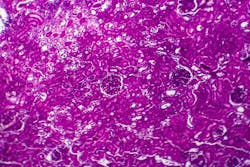In a study led by Johns Hopkins Medicine, in collaboration with Yale School of Medicine, researchers have identified a biomarker found via a simple urine test that can be used to diagnose acute tubulointerstitial nephritis (AIN), a medical condition that causes inflammation of the kidneys and can lead to acute kidney injury (AKI) — a sudden loss of kidney function.
Experts say a kidney biopsy is often required to diagnose AIN because there are no disease-specific signs or symptoms. However, testing for a protein called CXCL-9 in a person’s urine could be a noninvasive way to diagnose AIN without having to do a kidney biopsy.
Results of the study, which overall looked at more than 180 potential immune system biomarkers, were published July 3 in the Journal of Clinical Investigation.
For the study, the urine of over 200 hospital patients with AKI was tested for 180 potential biomarkers to identify the top AIN-associated CXCL-9 protein. Researchers found patients with AIN had a much higher level of the protein in their urine compared to people without AIN. They also looked at kidney tissue samples and found similar results. Together, the research team says, the results suggest use of the urine biomarker CXCL-9 can significantly improve clinical care by helping to rule in or rule out AIN in a large subset of patients, and limit the use of kidney biopsies for a narrower subset in whom biomarker values are unclear.





